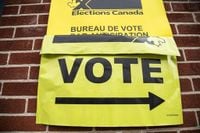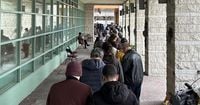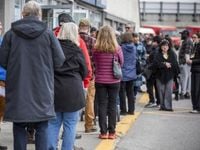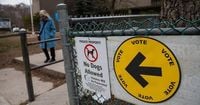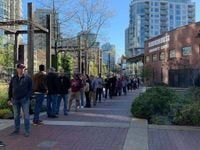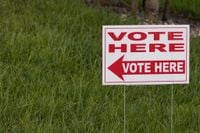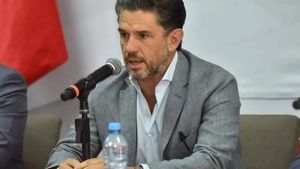Advance polls across Canada opened on Good Friday, April 18, 2025, ushering in the first wave of voting ahead of the April 28 federal election. With polling stations operating from 9 a.m. to 9 p.m. until Easter Monday, April 21, Canadians are taking advantage of the long weekend to cast their ballots early.
Reports from various regions indicate that voters are encountering long lineups, with some waiting over an hour to cast their votes. In Ottawa, Kevin Ryan arrived at his polling station in the Carleton riding shortly after the polls opened, only to find a line that was barely moving. "The line was only about 15 to 20 people ahead of me and normally that moves fairly quickly," Ryan said, expressing frustration at the delay. He noted that many voters turned away upon hearing that the wait time had exceeded an hour.
Ryan lodged a formal complaint, citing a shortage of polling station workers as a contributing factor to the delays. He also observed that the unusually long ballot in Carleton, where Conservative leader Pierre Poilievre is running against a record-tying 90 candidates, was causing additional holdups. "The unusually long ballot had to be folded in a particular way, which took forever," he remarked.
Similar scenes unfolded across the Ottawa region, where voters like Carolyn Strauss braved the cold to stand in line at the MacKay United Church. A staff member informed her and others in line that they would likely face a 90-minute wait due to understaffing. Elections Canada spokesperson Diane Benson acknowledged that while the polls are open for four days, predicting peak times can be challenging. "We ask for their patience if they come at a busy time… hopefully they can find a time that is not a peak time," she said.
In Vancouver, voters faced long waits as well, with queues stretching outside the Roundhouse Community Centre. Staff reported that about 100 people were already in line when the polls opened. "We only have four tables," staff members apologized, suggesting that voters return later in the day when the lines might be shorter. Anecdotal reports indicated strong voter turnout across the country, with Elections Canada preparing for a wide range of contingencies.
James Hale, a spokesperson for Elections Canada, stated, "Returning officers have prepared for a wide range of contingencies, including large turnout." He cautioned against over-interpreting the first day’s turnout, as various external factors could influence voter behavior, including the long weekend and current political climate.
Historically, advance voting has seen significant participation. Nearly five million Canadians voted at advance polls in the 2019 election, and that number increased to 5.8 million in 2021. This year, with a new electoral map reflecting an increase in ridings from 338 to 343, voters may find themselves in different electoral districts. Edmonton Gateway is a new riding, while newly redrawn Edmonton Southeast and Edmonton Northwest return after decades.
As of now, 56 candidates are competing across nine ridings, with the Conservative, Liberal, and New Democratic parties fielding candidates in all districts, as well as the People’s Party of Canada. Voters have been encouraged to check their registration status online or via phone, with most receiving their voter information cards in the mail last week. Voters can also register in person at their polling stations.
In Fredericton, New Brunswick, the atmosphere was similarly charged. Nicole Bent, who voted early, expressed that the election felt more significant this time around due to recent U.S. political rhetoric. "It feels more important to vote and make sure we keep having the country that we want," she said, indicating that the election has personal stakes for her.
Mark Kunkle, another voter in Fredericton, echoed the sentiment, stating, "All elections are important, but in this particular case, it’s pretty, pretty important because the future of the country is going to be decided." However, not all voters were willing to wait; Bill Randall left the line after seeing how long it was, planning to return the next day.
In Whitby, Ontario, retired police officer Guy Service expressed hope that his vote could end what he sees as a decade of Liberal governance, which he blames for the current housing crisis. He noted the diverse opinions among voters waiting in line, emphasizing a respectful dialogue despite differing views.
As voters prepare for the upcoming election, they are reminded of the importance of bringing accepted forms of identification, including voter information cards, bank statements, or government-issued IDs. Those who wish to vote by mail must register by April 22, 2025, as doing so will prevent them from voting at advance polls or on election day.
As the advance voting period continues, Canadians are encouraged to participate actively in shaping their political landscape, with Elections Canada urging voters to plan their visits to avoid peak times.
The excitement surrounding the election, coupled with the logistical challenges of advance voting, highlights the engaged electorate in Canada. With just over a week to go until the official election day, the anticipation is palpable as voters prepare to make their voices heard.
